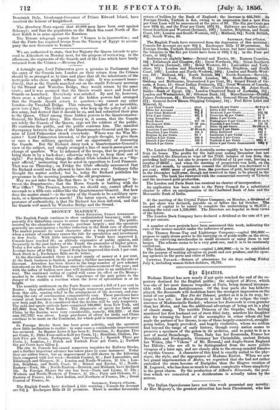tt4tatrts.
Madame Ristori has now nearly if not quite reached the end of the re- pertory destined for the English public ; the subject of •Afirra, which was one of her most famous tragedies at Pas, being deemed incompa- tible with London fastidiousness. Of the four parts she has hitherto played, the Rosmunda will doubtless leave the strongest impression on the mind of our public. Her Pia del Tolomei, perfect as it is in its way, be- longs to low art ; her Maria Stuarda is not likely to eclipse the remi- niscence of Mademoiselle Rachel ; whereas her Ronnunda is even grander than her Medea, and has the additional advantage of being set in a play of classic stamp. The terrible Princess of the Gepidie, who, having murdered her first husband out of stern filial duty, murders his daughter also for winning the heart of the accomplice in crime whom she has made the partner of her throne' is one of those largely-conceived, straight- going going ladies, hugely provoked, and hugely vindictive, whom we seldom find beyond the range of early history, though every nation seems to preserve a specimen of the genus in ita archives, and to point to it as a sort of moral Stonehenge. Thus, Italy has her Rosmunda, France her Brunhilda and Fredegonda, Germany her Chrimhilda, ancient Britain her Widen, (the " Videna " of Mr. lieraud,) and Anglo-Saxon England her Elfrida ; who are all to be distinguished from the more politic viragoes of a later age, and are closely akin to the strong-minded females of mythic Greece. A character of this kind is exactly suited to the phy- sique, the style, and the appearance of Madame Ristori When we saw her grand impersonation of Medea, we regretted that she had not rather embodied the stern heroine of Euripides than the filagree creation of M. Legouve, who has done so much to obtain complexity where simplicity is the great charm. By the production of Alfieri's Rosmunda, the posi- tion which we conceived as a desideratum is actually taken by the actress.


































 Previous page
Previous page